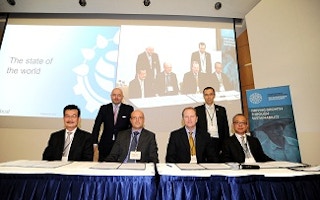A global network of businesses working for sustainability launched its 63rd chapter in Singapore last week with a clear challenge for Asian companies to take part in a transformational change.
Addressing the 180 business leaders and academics at a conference on responsible business at Singapore Management University (SMU), World Business Council for Sustainable Development (WBCSD) president Peter Bakker called for a revolutionary change in the way the earth is managed, saying that humans are overstepping planetary boundaries much more than people realise.
“It’s a scandal. The amount of damage is unbelievable and the emissions are unacceptable,” he said, referring to world hunger, environmental degradation and rising social and economic concerns.
Today’s world faces the same environmental challenges that received global attention in the 1970s, and the efforts of policymakers to address them – such as the recent global earth summit in Brazil known as Rio+20 - have often failed, he added.
“You would think any time humans take 40 years to study a subject, they make progress. This is not true,” he said, noting that a child dies of hunger every six seconds despite adequate global food production.
The key to finding solutions and scaling them up quickly is to get business to take the lead, he noted.
“When we look back at Rio+20 in 20 years, we will look at it as the conference when business took over,” he said.
The five founding companies of the BCSD Singapore – property developer City Developments Limited, palm oil exporter Apical Group Limited, technology consultant and testing firm Det Norske Veritas, Dow Chemical Pacific (Singapore) and agricultural technology firm Syngenta Asia Pacific – joined the network of 200 global companies to work towards the shared sustainability goals outlined in WBCSD’s Vision 2050 report.
Mr Bakker said that WBCSD members needed to establish solutions for those goals by 2020 so that they could be scaled up through 2050.
Created by chief executives and experts from 14 industries over an 18-month period, Vision 2050 goals include integrating environmental costs and benefits into the current market economy, halting deforestation and improving plantation management, halving global greenhouse gas emissions from 2005 levels and increasing energy efficiency and low-carbon transport. They also include doubling food production without added burdens on land and water use.
Director of agriculture for the World Bank Juergen Voegele, who spoke at the same conference on a sustainable agriculture panel, said that to feed the expected 2050 population of nine billion, farmers would have to increase yields on existing land because expanding agricultural lands on a large scale was not an option.
He cautioned that farmers faced numerous barriers to investment in increasing productivity, including price volatility, insufficient research and development in improved technologies, and uncertain land use rights.
Global food consumption has outstripped production for four years straight, leaving a mere six weeks of surplus food supply currently, he said. The resulting nervousness and volatility in food prices has alerted policymakers to the fact that “if we don’t get food security right, we won’t get national or global security right”, he added.
Moreover, water scarcity, climate change and changing populations – most of the population expansion through 2050 will be in food insecure regions – mean that agricultural production and consumption trends will not go back to business-as-usual, said Mr Voegele.
“We are not winning the (food security) battle the way we are working now. That needs to change,” he said.
However, the agriculture sector is beginning to make progress on getting governments, NGOs, businesses, and large and small-scale farmers to work together to increase R&D and technology transfer, and also to address land tenure and investment issues, he noted. He had seen a “massive sea-change in behaviour” in the past 18 to 24 months, he further noted.
The conference, called the Responsible Business Forum for Sustainable Business, was hosted by sustainability events firm Global Initiatives and BCSD Singapore, with support from SMU, TEEB for Business Coalition, Singapore’s Economic Development Board, the Institute of Chartered Accountants of England and Wales and Syngenta.
The event also kicked off the opening of the global headquarters of the TEEB for Business Coalition in Singapore.
The aim of the Coalition, of which WBCSD is a member, complements the WBCSD vision of integrating environmental costs and benefits into current business models and balance sheets.
WBCSD’s Mr Bakker said that, from a business perspective, such integration will “change the rules of the game” by putting financial resources to work and allowing companies to seek returns on social and natural capital investments.
“Price nature. Put it in the P&L (profit and loss statement), and we will get a revolution,” he said.

















